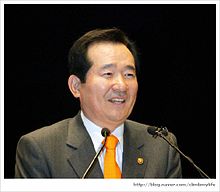- Uri Party
-
Our Open Party
열린우리당
Yeollin Uri-dang
President Chung Sye Kyun Founded 2003 Dissolved 2007 Split from Millenium Democratic Party Merged into United New Democratic Party Headquarters 133 Yeongdeungpo-dong 6-ga, Yeongdeungpo-gu, Seoul, South Korea Ideology Liberalism International affiliation None Official colours Yellow, green(informally) Seats in the National Assembly — Website www.uparty.or.kr Politics of South Korea
Political parties
ElectionsUri Party Hangul 열린우리당 Hanja 열린우리黨 Revised Romanization Yeollin Uri-dang McCune–Reischauer Yŏllin Uri-dang The Yeollin Uri Party (ko: 열린우리당, en: "Our Open Party"), generally abbreviated to Uri Party (ko: 우리당, en: "Our Party"), was the briefly ruling political party in South Korea (2004–2007) with a centrist political ideology. Chung Sye Kyun was the last leader of the party and twice served as its chairman.
Contents
Brief history
The party was formed when loyalists to president Roh Moo-hyun in the Millennium Democratic Party chose to break ranks from other party members who showed lukewarm support for the administration. Some 42 out of 103 lawmakers of the Millennium Democratic Party joined the new party, and 5 lawmakers from the Grand National Party also joined, seeking to complete political reforms.
As a result of the 2004 Parliamentary election, Uri party achieved its first nationwide majority in the legislature by winning 152 of 299 seats.
Party platform and policy direction
Policywise, the Uri Party emphasized increased spending on social services for the low-income population while de-emphasizing economic growth. It was conciliatory towards North Korea while moving away from the traditional military alliance with the U.S. and Japan. Indeed, even after the testing of a nuclear bomb by North Korea, the Uri Party members have called for continued unconditional aid to North Korea, triggering heavy criticism and charges of its harboring Communist sympathizers. The Uri Party placed most of the blame for the crisis on the hard-line policies of the United States.
Significant events
The party came to international attention when their members physically blocked the speaker's chair in the National Assembly in a failed attempt to prevent the impeachment vote on President Roh on March 12, 2004. (The vote was subsequently overruled by South Korea's Constitutional Court on May 14, 2004.)
On August 19, 2004, the party suffered an embarrassing setback when party chairman Shin Ki Nam resigned following revelations by a national investigation that his father had worked for the Japanese military police during the Japanese occupation. The investigation, initiated on the 56th anniversary of Liberation Day (August 15, 2004) by President Roh, was a part of a national campaign to shed light on the activity of collaborators during the Japanese occupation. Ironically, the campaign was vocally supported by Shin and backed by the Uri Party.
The party's popularity has decreased considerably after the 2004 election because of internal strife and scandals related to the President, who had admitted to feeling "incompetent" and unfit for the job.[1] The Uri party failed to secure a single seat out of six electoral districts in the by-election held on April 30, 2005, losing its majority status in the National Assembly.
Prior to the Uri Party's devastating defeat in regional elections held on May 31, 2006, Chung apologized for the party's "self-righteous attitude and inadequacy". The party failed to win in all but one area, while the opposition Grand National Party took 12 of the 16 key regional posts in the election. The Uri Party even lost in Daejeon, a city long considered a secure ruling-party stronghold. [2]
Merger with the United New Democratic Party
On August 18, 2007, the delegates of the Uri Party decided to merge with the newly created liberal party called "the United New Democratic Party" to form the Democratic Party.[1]
See also
- Liberalism
- Contributions to liberal theory
- Liberalism worldwide
- List of liberal parties
- Liberal democracy
- Politics of South Korea
- Liberalism in South Korea
- List of Korea-related topics
References
- ^ Uri Disbands to Merge With Liberal Party, The Korea Times, Retrieved on August 19, 2007
- (Aug. 19, 2004). Disgraced Seoul party boss quits, BBC News.
- McGeown, Kate (Aug. 19, 2004). Raking over S. Korea's colonial past, BBC News.
- "Police Raid Uri Party's Office", The Korea Times, January 16, 2006.
External links
Categories:- Defunct political parties
- Defunct liberal political parties
- Liberal parties
- Political parties in South Korea
- Political parties established in 2003
- Political parties disestablished in 2007
Wikimedia Foundation. 2010.

